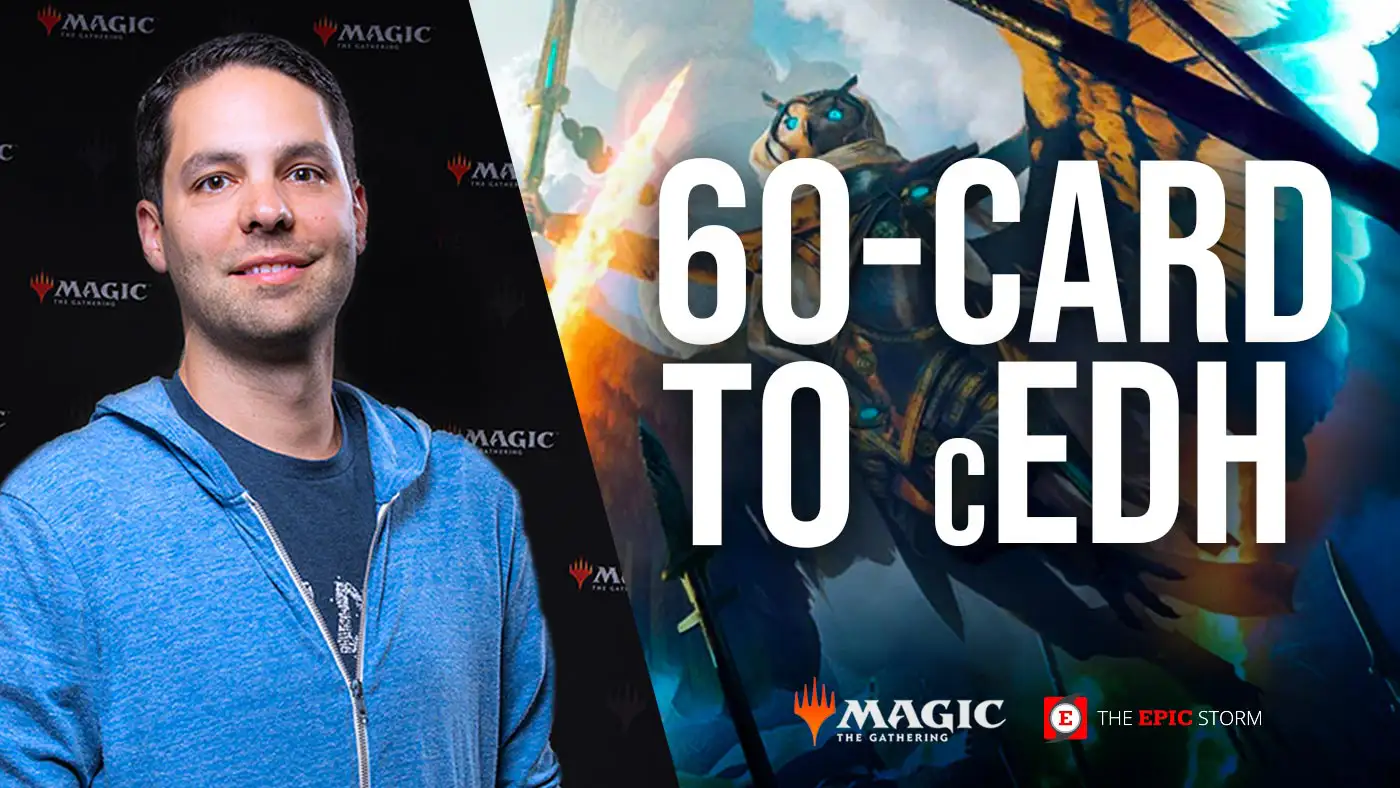Competitive EDH (cEDH, pronounced Seee-Dee-H) is the competitive-player-driven project to use the rules and card pool just as they are in regular Commander (EDH) in games of four players who are all trying approximately their hardest to win the game.
Today, I'm going to make the case for more competitive 60-card players (a term we use for non-cEDH/EDH Magic players, [[Yorion, Sky Nomad]], Ben Rubin, and limited notwithstanding) to give cEDH a try. I've had so much fun trying cEDH that I hope to persuade more people with a background similar to mine to give it a shot.
Debunking common criticisms
Magic itself wasn't designed for access to every card or limits of four cards per deck or tournaments with a sideboard, etc. The guiding principles in a game's or a format's design do not create locked-in constraints on future players. All that cEDH needs to justify its existence is four-plus players who find it fun, and we have many more than four in this growing community.
In terms of how the games play out, it feels much more like Vintage and Legacy than a game of Standard or Pioneer does and the differences are interesting to learn and explore. cEDH isn't perfect, but why would that be the goalpost? No format is perfect.
Kingmaking/queenmaking and politics are fine in casual, but create major issues in competitive play.
This was one of, if not the single biggest, concerns I had before getting into cEDH. I'm not very interested in games of Magic that transpose into diplomacy or popularity contests. Having played many games of the format, I can confidently say that these dynamics are very much background dynamics in cEDH, not foreground. They come up sometimes, they determine the outcome sometimes, but not as often as I feared coming into the format.
Somewhat counterintuitively, these issues are actually more detrimental to the casual experience, in my limited experience with EDH, than the competitive one. In competitive, most games don't have explicit alliances and collaboration is more tacit. When Player A casts [[Ad Nauseam]], Players B and C don't need to sign a treaty to start working together to make sure it doesn't resolve. The stuff people are doing is so powerful that it's often fairly obvious who is about to win and what needs to be done. If Player D casts [[Collector Ouphe]], Players A and C who have a bunch of artifact mana out might work together on making sure some removal resolves, without ever saying a word about their “alliance” or anything like that. In some games, there might be a more explicit discussion, but because the players are usually being very logically oriented towards winning (at least in my play groups), these conversations are pretty interesting and often succinct and focused in a way casual games don't consistently get to.
Another day, I'll write separately on the topic of how to make this stuff even more background in cEDH by abandoning almost all usage of the concepts of kingmaking/queenmaking and “spite plays” from the cEDH lexicon, but I don't have time to get fully into it here.
(adsbygoogle = window.adsbygoogle || []).push({});
Nope. That little “c” in front of EDH does a TON of work. Is winning on turn 1 or 2 of the game ok? Of course. Are infinite combos ok? Encouraged. Is [[Thassa's Oracle]] plus [[Demonic Consultation]] ok? What about the [[Worldgorger Dragon]] combo I happen to love? Yes and yes. No need to have these conversations before a game night or a particular pod. We already know the answers.
Is this stuff fun? Yes again, because the players are trying to stop each other using stax pieces (permanents that make combos and resource accumulation more difficult) and spell-based interaction (counters, removal, etc.). It maps pretty closely to Vintage. Turn-one wins happen but are more rare than outsiders predict, and if they do happen the next game starts pretty quickly and life moves on, while the losing player(s) refine their strategies for how to interact better.
“Is it fun?” is always subjective, but for my audience for this article (competitive players who mostly understand and enjoy what's happening in formats like Legacy and Modern) I predict the answer will be Yes when you try cEDH.
No, the exact opposite. This format is VERY proxy friendly. I regularly play online over webcam and IRL with players who have 100 proxy decks. Nobody cares! There's no format with a lower financial barrier to entry.
Funny story from when I first started playing cEDH a few months ago: I kept learning about new cards by having to Google them, as someone would say like “My opponent tutored for Derevi” when telling a story and I wouldn't know what [[Derevi, Empyrial Tactician]] was. At one point a player mentioned a name I hadn't heard of yet, so I did my usual lookup on Scryfall or Google and couldn't find anything. Turns out, it was a player's username, not a card's name.
In general, the learning curve on relevant cards is there, but it's not that crazy. Most Magic cards simply are not powerful enough to see play in cEDH, and it doesn't take all that long to learn about the ones (like Derevi) that are.
First of all, you might be surprised as I was to learn that there are cEDH players near you, lurking in the shadows. Waiting to hand a small child a copy of [[Underworld Breach]] while their parents aren't looking.
There are a bunch of Discord servers that attempt to organize online and IRL play and by asking around on Twitter or in other Discords you can probably find the right one(s) for your area. If you get stuck, just play a cEDH deck in your local EDH FNM and when those players tell you to fuck off politely ask where to (just kidding, we don't do this). You can always ask if your local game stor hosts a cEDH night or has a playgroup, and they might like mine does.
(adsbygoogle = window.adsbygoogle || []).push({});
There are couple ways to answer this. First, the outsider perspective on anything less casual that what your group is doing is often “seems toxic” whether that's fair or not. Second, I'm sure there are some toxic people in cEDH, just as with any large group, and it's possible they were more highly concentrated in cEDH when the format was newer and less popular. I can say now that the community has grown in ways that made it easy for a newcomer like me to see mostly old relics of toxicity rather than new construction of it. I'm not here to say that I know everyone will be welcomed or feel welcome because I was, but I haven't seen anything that stuck out as a glaring red flag so far in ways that aren't simply common to every online gaming space. The IRL stuff I've participated in seemed to draw an inclusive and friendly crowd and seemed pretty normal as well.
We're talking about Magic in 2022/2023, so I certainly wouldn't count on it! There are events that award $1,000 to first that allow proxies, which is a great combination of things, but in general, I advise all competitive Magic players to avoid the copium of thinking there are still a bunch of “plus ev” ways to play and understanding Magic as a negative expected value hobby whether you're playing casually or competitively. It's a great hobby, some say the best, but not because of prize money.
Not really. There are more than a couple tier 1 decks and many tournaments are won by decks I don't even have on my list of tier one decks. It feels like other popular formats with regard to archetype viability, and there is certainly no consensus best 100 cards for every commander, let alone a best 100 card consensus overall.










